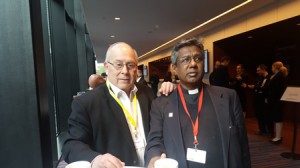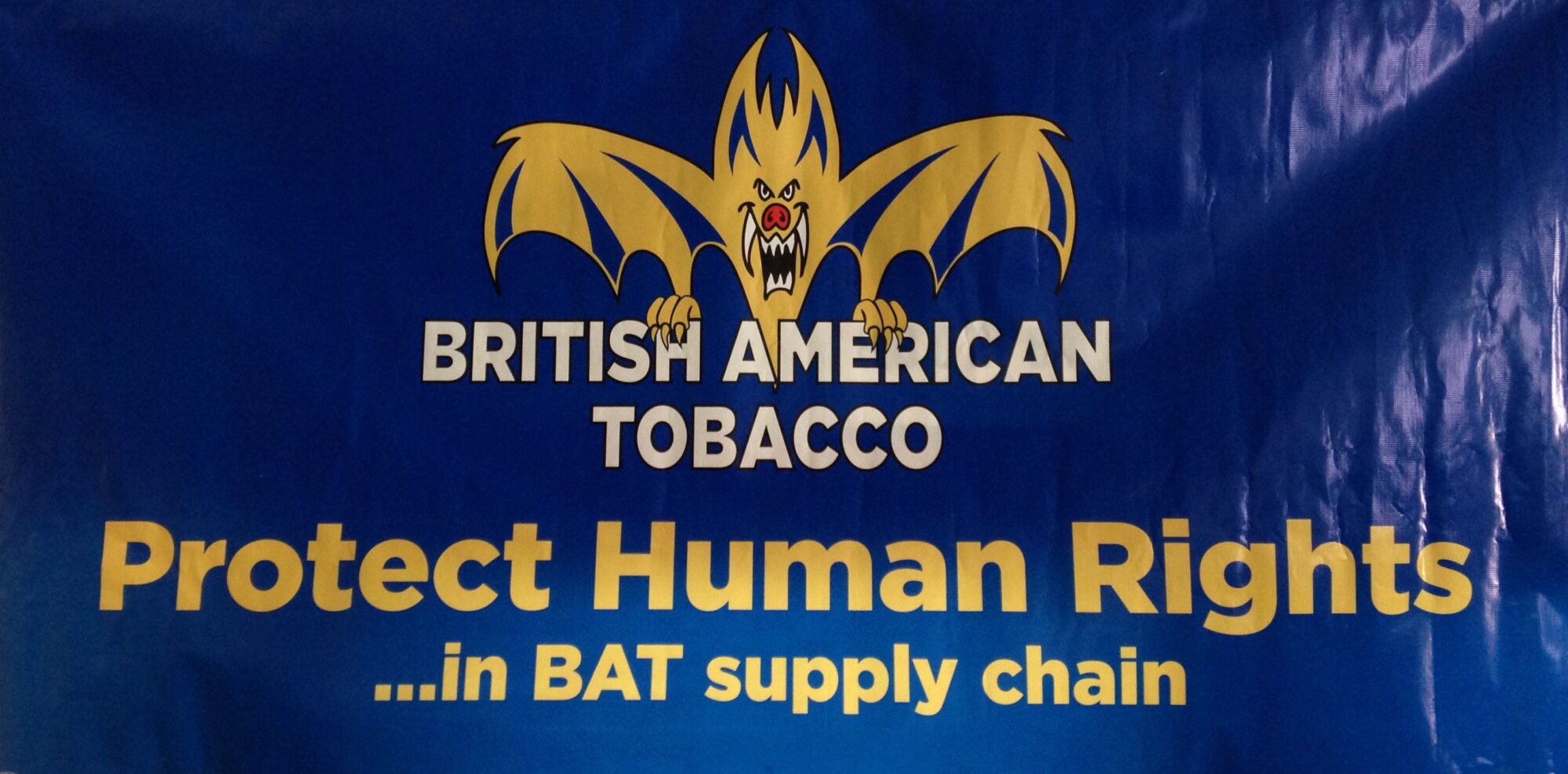April 27, 2016
 This year was the fifth year that President Velasquez attended the British American Tobacco (BAT) Annual General Meeting along with US and UK allies. This year Velasquez was joined by Raul Jimenez, former farmworker and FLOC staff, and Reverend Singh, minister of the United Reform Church in South London and a Vice President of the Ecumenical Council for Corporate Responsibility,and Julia Long of UNITE. The delegation attended the meeting to press BAT, which owns 42% of shares of Reynolds American, Inc. (RAI), to use its influence with RAI to end human rights abuses in the tobacco fields in the American South, including child labor, squalid living conditions, wage theft, dangerous working conditions, and a lack of freedom of association.
This year was the fifth year that President Velasquez attended the British American Tobacco (BAT) Annual General Meeting along with US and UK allies. This year Velasquez was joined by Raul Jimenez, former farmworker and FLOC staff, and Reverend Singh, minister of the United Reform Church in South London and a Vice President of the Ecumenical Council for Corporate Responsibility,and Julia Long of UNITE. The delegation attended the meeting to press BAT, which owns 42% of shares of Reynolds American, Inc. (RAI), to use its influence with RAI to end human rights abuses in the tobacco fields in the American South, including child labor, squalid living conditions, wage theft, dangerous working conditions, and a lack of freedom of association.
At the meeting, the group circulated the following statement to BAT shareholders:
Five Years and Still No Progress for Tobacco Farmworkers
Dear BAT Shareholder,
I am president of the Farm Labor Organizing Committee (FLOC) which represents tobacco farmworkers in North Carolina and the American South. This is the fifth time that I have attended the BAT AGM. That’s five times that I have traveled from North Carolina to London to bring to you the concerns and struggles of thousands of migrant farmworkers, mostly from Mexico and Central America, who harvest Reynolds American’s tobacco.
BAT maintains 42% ownership of Reynolds American, Inc. (RAI). Recently there have been rumors in the financial press that BAT plans to acquire RAI. There is no doubt that BAT cares about its RAI investment, and it should finally use its influence to ensure that abuses do not exist on RAI contract farms. This is not the time for BAT to expose itself to another reputational risk such as the ongoing investigation of BAT bribery allegations in Africa.
History of the relationship between BAT, RAI, and FLOC
Since I first attended the BAT AGM in 2011, FLOC has seen absolutely no progress in resolving human rights abuses in the RAI supply chain. These are conditions that we have observed in spite of what RAI has been telling BAT about the accuracy of its auditing procedures.
Following discussions between BAT, FLOC, and RAI in 2015, RAI has been feeding BAT a series of distortions and falsehoods about the conditions in the fields, the status of meetings between RAI, FLOC, and other tobacco companies, and what FLOC is asking RAI to do.
To be clear, FLOC has never demanded that RAI negotiate a collective bargaining agreement with FLOC, nor is FLOC asking RAI to force a union on their suppliers. We are simply asking RAI to sign a Memorandum of Understanding outlining a process for guaranteeing freedom of association where none exists under US law for tobacco farmworkers.
RAI has also said that FLOC’s requests are impossible due to local laws. North Carolina right to work laws do not prevent tobacco farmworkers from exercising their right to freedom of association, but offer no protection from retaliation by an employer.
The Farm Labor Practices Group
FLOC’s experience is clear: only by guaranteeing a process of freedom of association and worker representation without retaliation on RAI contract farms can these conditions be adequately addressed. BAT has encouraged FLOC to continue working through the Farm Labor Practices Group (FLPG), a multi-stakeholder group established after RAI’s 2012 shareholders meeting, to address and remedy our concerns about farm labor conditions. However, The FLPG has marginalized the discussion of freedom of association, and has instead looked to cosmetic approaches, such as increased training on farms, which will have no long term effect on the inequities which are endemic to the tobacco supply chain. Furthermore, RAI is a leader among the tobacco companies that participate in the FLPG in its outspoken opposition to guaranteeing freedom of association.
In fact, RAI presented a resolution to the FLPG to establish a grievance mechanism with binding arbitration without freedom of association. This grievance mechanism would pressure workers to sign away their right to sue employers in court and would only cover legal violations. Under this proposal, farmworkers have no protection from being fired for organizing to improve wages, housing conditions, or other things not currently covered by inadequate state laws. How could we accept such an initiative by RAI? The U.N. Guiding Principles to which BAT adheres say that any “grievance mechanism” adopted has to affirm the human right of workers to freedom of association, and not be detrimental or negatively impact the rights of these workers to organize themselves to engage in collective bargaining.
BAT Has a Responsibility to Take Action
BAT has a real opportunity to show its leadership in the area of Human Rights by exerting its influence with RAI by advocating that RAI collaborate with FLOC to guarantee freedom of association on RAI contract farms.
Slavery, white supremacy, bitter racism, harsh treatment and degrading and demeaning conditions for tobacco farmworkers have a long tradition in the tobacco industry. BAT can ensure that these conditions are not allowed to continue in US tobacco fields in any form, by being part of a solution which finally puts into action the words of BAT’s human rights protocols.
Finally, BAT’s advocacy of establishing a process for farmworkers to exercise their right to freedom of association is good business practice in this era of corporate social responsibility, and one which our shareholders should applaud. Through the guarantee of freedom of association tobacco farmworkers will be free to develop organization which will ensure that BAT’s protocols are applied in real time. It will enhance shareholder value and BAT will be recognized for its leadership in the field of human rights.
How many more years will FLOC need to attend the BAT AGM before the company finally addresses the human rights concerns of tobacco farmworkers on RAI contract farms in the United States?
Sincerest Regards,
Baldemar Velasquez
